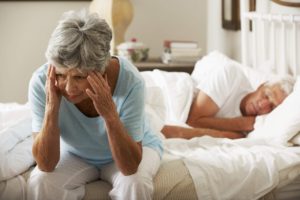
Getting some shut-eye can be one of the best parts of the day, but as you age, it can become more difficult to do so. Older adults can have a more difficult time getting to sleep, whether it is due to medications, stress, or other factors.
Anh Nguyen, PACC Resource for Ensign Services, says many elderly people suffer from insomnia and are sleepy during the day. “Excessive tiredness is not only frustrating, but it can lead to difficulty driving and performing other daily activities,” she says. “It is important for people suffering from sleep problems to talk to their doctor about changes that can help them sleep better.”
Although sleep troubles are common among the elderly, you don’t have to chalk it up to getting older. Some lifestyle changes can make a big difference in getting a good night’s sleep. Here are a few things you can do-or not do-to make your sleep more sound.
If you are having trouble sleeping at night, it is important to talk to your doctor before you head to the pharmacy and grab some over-the-counter sleep aids. A recent poll found that 46 percent of older adults have trouble falling asleep one night or more each week, but most of them did not talk to their doctor about the problem. Of those polled, 14 percent said they regularly take a medication or supplement to help them sleep. However, sleep aids are not meant to be used long-term and can cause problems for elderly individuals. Older people can experience confusion, constipation, and a higher risk of falls. Before reaching for a sleep aid, talk to your doctor about the best way to tackle your sleepless nights.
People who have trouble sleeping may use alcohol to help them fall asleep. While alcohol can make a person fall asleep faster, it can also have some unintended consequences that lead to a lower quality of sleep. Alcohol can cause a person to wake up frequently at night and earlier in the morning, both of which may make a person tired during the day.
A major contributor to disrupted sleep and feeling tired during the day is sleep apnea, though many people may not know they have it. Sleep apnea causes a person to stop breathing for periods as they sleep. If people tell you that your snoring can be heard in other rooms or that you stop breathing at night, talk to your doctor about getting tested for sleep apnea.
One tip that is often recommended for better sleep is something called “sleep hygiene.” Sleep hygiene includes all the activities you do during the day that affect how well you sleep at night. Good sleep hygiene practices include establishing a regular bedtime, staying away from caffeine within a few hours of bedtime, and starting a pre-bed ritual. It also helps to take a short afternoon nap and exercise regularly.
Make your bed and your bedroom a restful sanctuary. Keep it cool, dark, and quiet. Try using blackout curtains to limit the amount of light entering your room. Visit a website like soundproofexpert to learn more about how to soundproof your walls to ensure that you won’t be woken by loud noises and disruption. You could even invest in some earplugs if your house is particularly noisy at night. Make your room a calm place, without bright and loud electronics. Keep a book by your bedside rather than a screen.
If going to sleep is difficult for you, you are not alone. Many older adults have a hard time falling asleep for a variety of reasons. Give these tips a try, and be sure to talk to your doctor about any underlying problems that could be contributing to your sleep issues.
